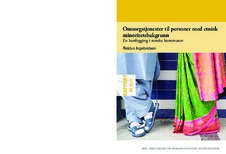| dc.description.abstract | Care Services for Persons from Ethnic Minorities The aim of the Project "Care Services for Persons from Ethnic Minorities" is to learn more about how municipalities give care services to ethnic minorities, how they plan to give such services in the future, and examples of how these services are performed in Norwegian municipalities. The project is financed by the Ministry of Health and Care Services. "Ethnic minorities" refers to people from immigrant backgrounds, indigenous people (Sami) and national minorities ((Kvens (people of Finnish descent in Northern Norway), Jews, Forest Finns, Roma and Romani people). Care services include municipal home-based services, day centres and nursing homes.) The methods in the study follow two steps. A request to participate in a survey was sent to all Norwegian municipalities. An electronic questionnaire (Questback) was used. The survey is based on experiences as they are conveyed by the managers of care services in municipalities and urban districts. The survey is supplemented by interviews with key persons in some municipalities. These provide examples of challenges and solutions in practice. All the 430 municipalities received an orientation and request for the survey. 262 responded positively and were sent the questionnaire, while 226 completed it. This gives a response rate of 85 percent for those who received the questionnaire and 51 percent of the total sample. Results are described according to the main topics of the survey: Regional assessment of need for care services among ethnic minorities: 73 percent of the municipalities in the sample report a certain demand for care services from persons with an immigrant background. Only a few report a frequent demand. Large municipalities (many residents) have most experience with care services for immigrant groups and they expect more demands in the future. An increase in demand for care services by people with ethnic minority backgrounds is expected in half of the municipalities. Nationwide, there are few municipalities (4 percent) which often have a demand for services by Sami people or national minorities; 70 percent state that they never have such demands. All municipalities can, however, receive requests where some knowledge of the mother tongue and cultural background is of importance for the care provider. In the administrative area of the Sami language, people have the right to services in Sami. The care service most commonly requested by people of ethnic minority backgrounds is home nursing care, followed by other home care services. 50 percent of the municipalities have a certain demand for short-term and 40 percent for long-term care in nursing homes. @ How do municipalities meet the demand for care services among ethnic minorities today? The challenges mentioned in caring for ethnic minorities are related to language, communication, culture/habits and religious practices. The care services throughout the country provide good examples of initiatives and flexibility in terms of creating dialogue and ensuring respect for the individual service user. Work to secure individualised care is linked with respectful contact, monitoring of needs, clear definition of expectations and special considerations in personal care. The use of a multicultural group of care workers combined with competence building among staff in general is emphasized. 90 percent of the municipalities have some experience in working together with people of immigrant background in the health care services. This is considered positive for cultural diversity and understanding. Respondents stress the importance of creating a common platform of language, learning and mutual exchange. In order to facilitate care for a diversity of users, information is emphasized together with interpretation services and consideration of traditions and religious practices in care and nurturing. @ How satisfactory are the care services offered to persons with a minority ethnic background today? About one-third of the sample considered the care services to be acceptable, one-third believe it is variable. Most of the final third have no experience, while a few point to unacceptable conditions. @ Plans to meet the demand for care services in the future: Half of the municipalities have care plans, large municipalities more frequently than smaller ones. @ What is needed to meet the demand for care services among ethnic minorities? Means to make it easier to meet ethnic minorities’ needs: 1. Improved communication, understanding and access to interpretation services. 2. Increased knowledge and expertise about ethnic minorities, their cultures and conditions of living. 3. Increased time for planning and organization of care services. 4. Clear plans, policies and schemes. @ Conclusions and proposals: Cultural competence can be seen as a prerequisite for other important instruments like information and accommodation of services. Results of the survey indicate needs for courses and competence building in the care services. A multicultural staff can be helpful to increase awareness and knowledge of different cultures. Strategic planning in the municipalities is proposed to meet future tasks. There are many suggestions of how to adapt the care services to the needs of people from ethnic minority backgrounds. These are related to: 1. An emphasis on user interaction, dialogue, clearly defined expectations, the general strengthening of the services and prevention. 2. Strengthening the care staff by training, competence building and human resources. An active recruitment policy and healthcare education for people with an ethnic minority background is recommended. 3. In order to reach the goal of meeting the care service needs of ethnic minority groups, questions regarding individualised provisioning of care services must be in focus in terms of planning and budget, service development and qualification of staff. Other proposals are guidance, coordination and cooperation between agencies and between municipalities, and systematic assessment of the possible future needs of the community. 4. A national area of commitment is proposed. Governmental priorities and guidelines are required in care services for ethnic minorities - with respect to resource centres, education, and guidance/consultation in minority health questions, translation services and tied grants for actions. | en |
